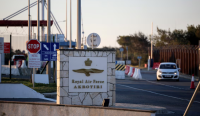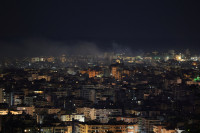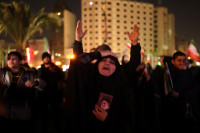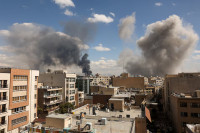World
UN considers bigger security force as gangs extend grip on Haiti
The US mission to the United Nations did not immediately respond to a request for comment.
Reuters
The United Nations Security Council began talks on Friday on a draft resolution for Haiti to bolster and expand a struggling international force fighting armed gangs, but some Haitian security experts warned the proposals lacked clarity.
Armed gangs have taken control of almost all Haiti's capital Port-au-Prince in an extended conflict that has forced some 1.3 million people from their homes, killed thousands and fueled famine-level hunger.
The draft resolution, put forward by the United States and Panama, aims to transition the existing Multinational Security Support mission, which is both underfunded and undermanned, into a new force called the Gang Suppression Force.
Like the current mission, which is led by Kenyan police, the anti-gang force would be funded through voluntary international contributions.
However, the leadership structure would be different. The new mission would be led by a Standing Group of representatives from countries that have so far contributed personnel, plus the United States and Canada, and be supported by a new UN field office to be set up in Port-au-Prince. A new force commander would be appointed by the Standing Group.
The proposal calls on the Americas regional diplomatic body, the Organization of American States, to follow up on its pledges of support with targeted assistance, including rations, communications and defense equipment.
Some Haitian analysts criticized the lack of a clear source of funding, however, and said the new plan duplicates existing structures and fails to address root problems.
Ricardo Germain, an independent security expert, said that besides funding he was particularly concerned by how the leadership would be replaced, adding that Kenya's challenging experience would likely discourage potential successors.
Jack Ombaka, spokesman for the Multinational Security Support mission, told Reuters the mission was still assessing the planned new model, but what was important was that it addressed the threats and benefited the Haitian people.
James Boyard, a security expert at the State University of Haiti, said the new model was too vague on coordination with local forces and that Haiti's exclusion from the Standing Group threatened the country's sovereignty.
"We would go from a democratic regime to an international tyranny," he said, adding that any potential crimes committed by security personnel would need a pre-determined oversight body.
The topic of foreign intervention in Haiti is a sensitive one. Past UN missions in Haiti resulted in civilian killings, a sexual abuse scandal and poor wastewater management that caused a cholera epidemic that killed more than 9,000 people.
Haiti's presidential office said it would comment once the official resolution was made public. The US mission to the United Nations did not immediately respond to a request for comment.
RETURNING TO RAVAGED NEIGHBORHOODS.
Just under 1,000 personnel, mostly Kenyan police, are currently deployed in Haiti - fewer than half the 2,500 troops the mission had hoped for.
The new force would authorize a deployment of up to 5,500 personnel. The draft resolution did not say how it would secure this number.
The existing mission was first authorized by the UN Security Council in October 2023, and the first Kenyan police arrived in June 2024.
Its 12-month mandate was renewed and is set to expire on October 2.
As the death toll climbed, Haiti's government in March began working with a private military company run by Erik Prince to use explosive-packed drones to target gang strongholds, and the company is planning to expand its operations.
Earlier this week, prominent gang leader Jimmy "Barbeque" Cherizier withdrew his soldiers from several neighborhoods in north-eastern Port-au-Prince and urged former residents to return to their homes in a video message circulated on social media.
Boyard said this was likely intended to revive the economy in neighborhoods his gang had destroyed so he can again extort money from residents, and use them as human shields to dissuade drone-backed security advances.
Residents began to return to the ravaged neighborhoods this week, carrying canvas bags past piles of rubble and the husks of burned-out cars. Some told Reuters they had lost everything and found their former homes destroyed.




 9.7°C Kathmandu
9.7°C Kathmandu














